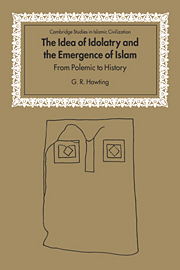Book contents
- Frontmatter
- Contents
- Preface
- Note on transliteration and dates
- List of abbreviations
- Introduction
- 1 Religion in the jāhiliyya: theories and evidence
- 2 Idols and idolatry in the Koran
- 3 Shirk and idolatry in monotheist polemic
- 4 The tradition
- 5 Names, tribes and places
- 6 The daughters of God
- Conclusion
- Bibliography
- Index
3 - Shirk and idolatry in monotheist polemic
Published online by Cambridge University Press: 05 July 2009
- Frontmatter
- Contents
- Preface
- Note on transliteration and dates
- List of abbreviations
- Introduction
- 1 Religion in the jāhiliyya: theories and evidence
- 2 Idols and idolatry in the Koran
- 3 Shirk and idolatry in monotheist polemic
- 4 The tradition
- 5 Names, tribes and places
- 6 The daughters of God
- Conclusion
- Bibliography
- Index
Summary
We have seen that the attacks made in the Koran against those opponents who are accused there of practising shirk do not sit easily with their portrayal in Muslim tradition as adherents of crude polytheism and idolatry. Although the Koran often imputes idolatry and polytheism to the mushrikūn, it does not do so consistently and, from the limited indications the Koran provides about their beliefs and practices, we are hardly entitled to conclude that they were polytheists or idolaters in any sense that would be accepted outside the sphere of polemic between people regarding themselves as monotheists.
It will now be shown how the accusation of shirk in Islam echoes that of idolatry in forms of monotheism that use vocabulary derived from the Greek eidōlolatreia. Just as idolatry is frequently a charge made against individuals or groups who, by their own lights, are committed monotheists, so too in Islam the accusation of shirk is a term often used in polemic directed against people who would describe themselves as fully monotheistic and, frequently, as Muslims.
Since that is so, why has it been generally accepted that the mushrikūn of the Koran were polytheists and idolaters in a literal sense? The answer to that question is, of course, ‘because Muslim tradition tells us that they were’.
- Type
- Chapter
- Information
- The Idea of Idolatry and the Emergence of IslamFrom Polemic to History, pp. 67 - 87Publisher: Cambridge University PressPrint publication year: 1999



